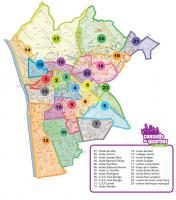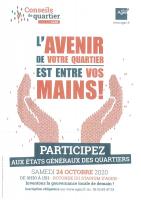
In 2008, in order to provide answers in terms of participatory democracy and to improve on all questions of local works, the City of Agen decided to create Neighborhood Councils, even though there is no legal framework for it compelled to do so.
[[{"fid":"47506","view_mode":"default","fields":{"format":"default","field_file_image_alt_text[und][0][value]":false,"field_file_image_title_text[und][0][value]":false,"field_author[und][0][value]":""},"link_text":null,"type":"media","field_deltas":{"1":{"format":"default","field_file_image_alt_text[und][0][value]":false,"field_file_image_title_text[und][0][value]":false,"field_author[und][0][value]":""}},"attributes":{"style":"float: right; width: 150px; height: 149px;","class":"media-element file-default","data-delta":"1"}}]]The idea was to bring out representatives in each district, having for the inhabitants the legitimacy to act.
« Finally, those who know their neighborhoods best are the people who live there. »
Jean DIONIS DU SEJOUR
Mayor of Agen
A successful achievement under three conditions:
1. Size of Neighborhoods
For the sake of proximity, the City of Agen has been divided into several comparable “district-villages”. To do this, it was decided to create small neighborhoods based on the 23 existing polling stations.
The reason for this method is that the polling stations divide the city into equal parts of the population: between 1000 and 1500 people, thus making it possible to obtain neighborhoods on a human scale.
Thus, in 2009, the city was divided into 23 Neighborhood Councils organized into associations (Law 1901). The Neighborhood Councils therefore administer themselves independently.
2. District Council elections by universal suffrage

The inhabitants of each district put together lists made up of 9 inhabitants of their district, then elections are organized in each district and the citizens vote in their respective polling station for a list of 9 volunteer citizens.
Thus, 207 citizens (9 in each of the 23 Neighborhood) are elected by universal suffrage throughout the city to “represent” the fellow citizens of their district.
On average, the participation rate was about 25% during the first mandate and 17% for the second mandate. The last elections showed a participation rate of 23%, it should be noted that they were organized, for the first time, with the possibility for residents to vote online, by post or at the polling station. Each mandate of the Neighborhood Councilors is 6 years (identical to the mandate of the Mayor).
3. Neighborhood Contracts and a dedicated Municipal budget
As soon as they were set up, the Agen municipality decided to give the Neighborhood Councils a specific area for their mandate: to define, in conjunction with the inhabitants, the development actions for the district. This task, usually carried out by the road services of the city administration, was entrusted to the citizens as well as the budget provided for this purpose.
This is how each Neighborhood Council was assigned: the management of a budget of €375,000 for the 6-year mandate, i.e. more than €8 million in total, and how to spend it on develop their neighborhood, i.e. which streets to renovate, which sidewalk to transform, etc.

Each year an annual physical meeting is organized during which an evaluation is made with the elected officials of the Municipality. The Neighborhood Councils decide on the works to be carried out, the streets they wish to renovate (and how they wish), then they give their decisions to the city administration which checks the feasibility of their requests and launches the construction works .
This form of “public service delegation” to the citizens was an internal revolution (within the city administration) because the “powers” of the road service were suddenly entrusted to the citizens. The Neighborhood Councils therefore have both the power to decide on the maintenance program as well as the allocated budget.
The Municipality of Agen supports the Neighborhood Councils in their procedures through elected Neighborhood referents. Initially 1 elected official of the Municipality was dedicated to each of the districts, but for reasons of improving the dialogue between elected officials and Neighborhood Councilors, but also for a better consideration of the needs, it is now 4 elected officials of the City who are in charge of this follow-up as elected Neighborhood Referents on all 23 Neighborhood Councils.
The positive elements resulting from the establishment of Neighbourhood Councils:
12 years later, the experiment has proven to have at least 3 key positive effects:
1. No neighbourhood is forgotten.
Before the creation of the Neighbourhood Councils, the Roads Department decided on the works to be carried out, the streets to be renovated, etc. This “arbitrary” way of deciding what and where to renovate the streets often meant that some of the neighbourhoods would not be renovated for several years because the technical services did not deem it necessary to renovate them. Thanks to the establishment of Neighbourhood Councils, each district now benefits from improvements since each Neighbourhood as a Council decides what it wants to do and with what budget to carry out the work. No more neighbourhood is "forgotten" and real equity is applied to the whole of the City of Agen.
2. Responsiveness of citizens versus responsiveness of the city's technical services
A city is made up of hundreds of streets, from large avenues to small alleys. It is very difficult for the technical services to systematically identify each problem in all the districts of the city. Before the establishment of the Neighbourhood Councils, it could take a long time for the Municipal services to realize the necessary repairs to be made.
On the other hand, when it is the citizens who decide, with the help of the Neighbourhood Councils, identifying and monitoring the problems is much faster, because the citizens live in these streets. They are therefore much more reactive and can report each problem very quickly (and correct it since they have the power to decide and to do). Unmounted cobblestones, a bent street sign, a broken bench... can therefore be corrected more quickly than before.
3. Leverage citizens' ideas and expertise
On several occasions, the contributions of citizens were able to unblock certain situations that the city administration itself was not able to resolve. For example, a school entrance which was dangerous in the morning and at the end of the day, when the parents came to pick up their children, because the cars concentrated on the sidewalk and in the street. The city's technical services as well as the elected officials worked for several weeks on the subject, without managing to find a solution, until the citizens were involved. The concerned Neighbourhood Council came up with an idea that no one had even considered within the city administration, and which ended up being a problem-solving proposal (the solution was to move the school entrance towards a surrounding street and delimiting a pedestrian area).
Thanks to the Neighbourhood Councils, the municipality has seen the birth of a generation of projects much closer to citizens than before. Indeed, building on the ideas and expertise of citizens has proven to be a very relevant approach for the city. Since their creation, the Neighbourhood Councils have initiated many major projects having a direct impact on the daily life of the people of Age, in various fields such as: urban development, improvement of the living environment, security, entertainment … 729 actions were launched thanks to the Neighbourhood Councils between 2008 and 2020, for an overall budget of more than 20 million euros.
Constant improvement of the participatory democracy system
In order to facilitate local approaches with citizens, the City of Agen has developed a collaborative tool, but also sought to improve its strategy of participatory democracy by organizing General States of Neighbourhoods. It has also embarked on a process of reflection on a European scale through the URBACT system as Lead Partner of the Active Citizens Network.
1. Tell My City: A collaborative digital platform for reporting incidents in public spaces.
![]()
This platform widely relayed by the Neighbourhood Councils allows residents to publish photos of the problem, write a few lines to describe the problem and geolocate the report. All reports are then automatically sent to the city administration to address the issue.
In the first year, the city received more than 1430 reports, showing the growing success of this tool. It is now a hundred local requests weekly that are processed by the services of the City of Agen.
2. The General States of the Neighborhoods
After 12 years of operation, it was necessary to rethink the mode of operation of the Neighbourhoods Councils. To this end, a day of consultation was organized by the city with the participation of all the District Councils, to work both on new commitments and an improvement of the system, but also to take greater account of the opinion of the inhabitants of Agen.
20 new municipal commitments were born from the estates general of the districts, they opened the online and postal vote allowing a high participation rate in the last elections of the Neighbourhoods Councillors. They also gave them new skills.
The main new missions of the neighbourhood councils are twofold:
- The animation of the district with a dedicated budget up to 3000€/year and per District.
- The ecological transition with the possibility of benefiting from an additional financial envelope for the District Councils taking into account in their decisions the problems linked to climate change (e.g. through revegetation).
As more and more requests are made by the inhabitants and the Neighbourhood Councillors, a reorganization of the monitoring of the Neighbourhood Councils has been set up with 4 elected Neighbourhood Referents to allow a refocusing and a reduction in the number of elected Referents and better support and monitoring of Neighbourhood Councils and local requests.
3. The Active Citizens Network of the URBACT system
The very unique format of the Agen Neighbourhood Councils demonstrates a strong desire to give citizens more power and space in the city's decision-making. The mandate that was given to citizens was bold and shows a real ambition to move towards more participatory processes.
The Neighbourhood Councils of Agen have proven to be effective, and appear as an inspiring case for other cities at European level. Indeed, since 2019 the City of Agen has been involved in the URBACT program with 7 European partner cities, of small and medium sizes.
The Active Citizens network works on the theme of citizenship: rethinking the place of the citizen in local governance by finding a balance between representative democracy and participatory democracy while taking into account new technological tools.
Thanks to the URBACT methodology, the final Integrated Action Plan should allow the City of Agen to improve its democratical system and maybe the Active Citizens Network's results will show the way to other European cities. At least, it tries to bring its stone to the building of participatory democracy in Europe.
